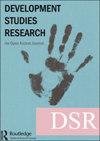Is informality a barrier to economic growth in Uganda? Empirical analysis
Q2 Social Sciences
引用次数: 15
Abstract
ABSTRACT We apply autoregressive distributed lag modeling approach to investigate the short- and long-run relationship between economic growth and informality in Uganda. We use annual time series data, covering the period from 1991 to 2017. We find evidence of short- and long-run relationship between economic growth and informality. The results indicate that an increase in informality significantly reduces the rate of economic growth in both the long- and short-run. This evidence seems to indicate that in low income countries where informality is high, a large size of the shadow economy is correlated with low rates of economic growth. This arises from the fact that informal businesses rarely pay taxes for their operations leading to low revenue collection by governments, which affects the provision of essential social services. We argue that the results of a negative relationship between economic growth and informality in both the long- and short-run are possible given the income level of the country under investigation. The practical policy implication from these results is that tackling low rates of economic growth requires also addressing the key drivers of informality in the country.非正式是乌干达经济增长的障碍吗?实证分析
摘要:本文采用自回归分布滞后建模方法研究乌干达经济增长与非正式性之间的短期和长期关系。我们使用的是1991年至2017年的年度时间序列数据。我们发现了经济增长与非正式性之间的短期和长期关系的证据。结果表明,非正式性的增加在长期和短期内都显著降低了经济增长率。这一证据似乎表明,在非正规性较高的低收入国家,影子经济的规模较大与经济增长率较低相关。这是因为非正规企业很少为其业务纳税,导致政府征收的收入较低,从而影响了基本社会服务的提供。我们认为,考虑到被调查国家的收入水平,经济增长和非正式性之间的长期和短期负相关关系的结果是可能的。这些结果的实际政策含义是,解决低经济增长率也需要解决该国非正规行为的主要驱动因素。
本文章由计算机程序翻译,如有差异,请以英文原文为准。
求助全文
约1分钟内获得全文
求助全文
来源期刊

Development Studies Research
Social Sciences-Development
CiteScore
3.20
自引率
0.00%
发文量
20
审稿时长
12 weeks
期刊介绍:
Development Studies Research ( DSR) is a Routledge journal dedicated to furthering debates in development studies. The journal provides a valuable platform for academics and practitioners to present their research on development issues to as broad an audience as possible. All DSR papers are published Open Access. This ensures that anyone, anywhere can engage with the valuable work being carried out by the myriad of academics and practitioners engaged in development research. The readership of DSR demonstrates that our goal of reaching as broad an audience as possible is being achieved. Papers are accessed by over 140 countries, some reaching over 9,000 downloads. The importance of the journal to impact is thus critical and the significance of OA to development researchers, exponential. Since its 2014 launch, the journal has examined numerous development issues from across the globe, including indigenous struggles, aid effectiveness, small-scale farming for poverty reduction, sustainable entrepreneurship, agricultural development, climate risk and the ‘resource curse’. Every paper published in DSR is an emblem of scientific rigour, having been reviewed first by members of an esteemed Editorial Board, and then by expert academics in a rigorous review process. Every paper, from the one examining a post-Millennium Development Goals environment by one of its architects (see Vandermortele 2014), to ones using established academic theory to understand development-imposed change (see Heeks and Stanforth 2015), and the more policy-oriented papers that contribute valuable recommendations to policy-makers and practitioners (see DSR Editor’s Choice: Policy), reaches a multidisciplinary audience.
 求助内容:
求助内容: 应助结果提醒方式:
应助结果提醒方式:


